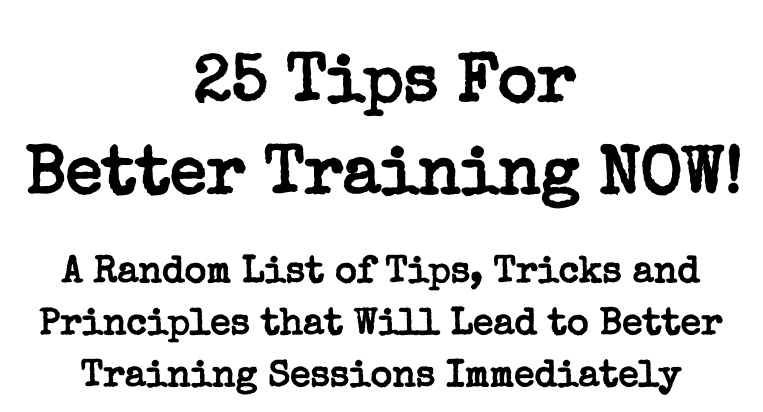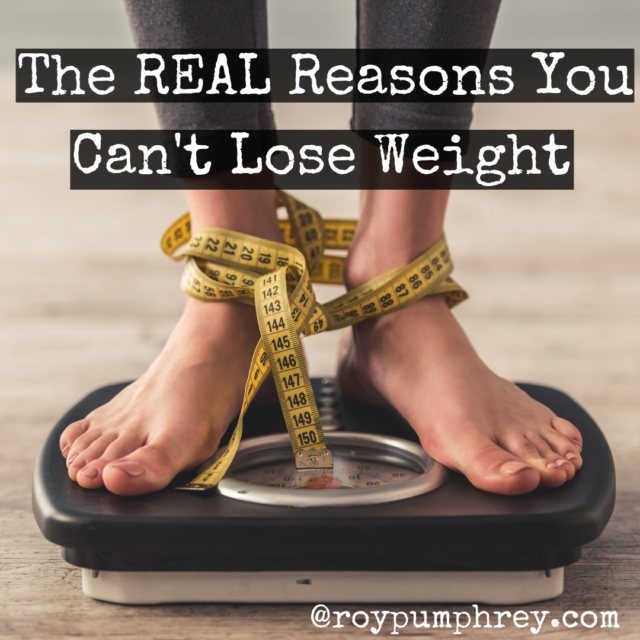
The REAL Reason(s) You Can’t Lose Weight
Last time we established It all comes down to energy balance.
Calories In vs. Calories Out.
Since the excuses you give yourself were eviscerated, here’s what I’ve found as the most common weight loss/ weight gain culprits.
*Except night time eating…last time I forgot about night time eating.
Riddle me This Batman: If a Calorie is a Calorie is a Calorie at 8pm any different than a calorie at 8am?
“Old perspectives for nighttime eating have been primarily based on populations of shift workers, night eating syndrome patients, and epidemiological data and suggest that the consumption of large mixed meals combined with irregular sleep patterns increase susceptibility to weight gain, obesity, and cardiometabolic diseases. In recent years, data from healthy men has shown that consuming small ~150 kcal protein-rich beverages appears to improve overnight muscle protein synthesis, morning metabolism and satiety.” – The Health Impact of Nighttime Eating: Old and New Perspectives
There is kinda sorta, maybe sometimes an exception for the very lean and where the calorie comes from (macronutrient) and training and such.
But for everyone reading this (myself included) the answer is pretty obvious.
No.
Nighttime eating, morning eating…it’s all the same.
Ok, on to this week.
Weekends
“I’m Really Strict During the Week, But Treat Myself on the Weekends”
Ok, fine.
But then you don’t actually have any interest in losing any weight.
NO, you can’t eat what you want Friday- Saturday – Sunday and lose weight.
Are you crazy?
Eating what YOU WANT TO is what got you here in the first place.
The calander says Friday, Saturday and Sunday so those calories don’t act the same?
You do realize that 3 days is 43% of your week.
Think about that for a second.
That’s Almost HALF Of Your Week.
I’m gonna lay some real high end science sh@t on you right now.
You Cant Trade Half Your Week In ANYTHING And Be Successful.
What if you told your boss,
“Hey, look, i’m gonna give ya a real solid 67% effort this week, K?”
Can You Eat Whatever Your Heart Desires on the Weekends?
Of course, its just a math equation.
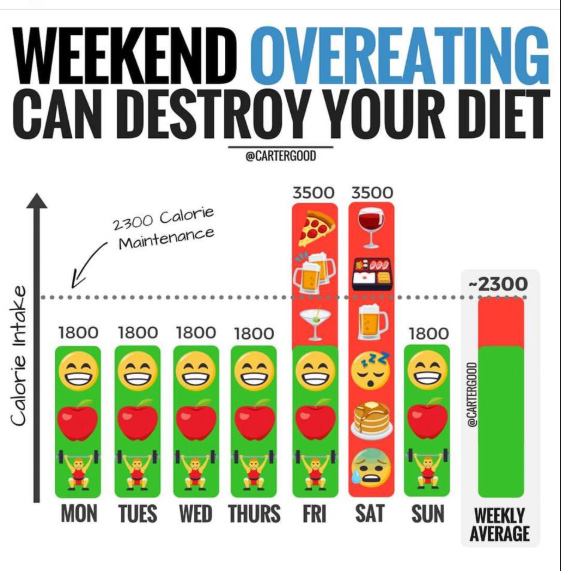 from Cartergood Instagram, it’s great, follow it.
from Cartergood Instagram, it’s great, follow it.
As long as you stay within your calorie allotment, you’ll lose weight.
But, what are you going to do?
Eat at a 1,000 calorie deficit, or more, Monday -Thursday?
Hangry: irritable or angry because of hunger
Probably not the best idea for your mental sanity and that of those around you.
Plus, going buck wild and gorging yourself for even a whole day is a great way to break a pattern of dietary consistency and totally fall off the wagon.
And falling off the wagon is obviously a bad thing.
In fact, it might be the worst thing when it comes to weight loss because the most important factor when it comes to successful weight loss is:
Consistency
If you’re going to be successful in weight loss, YOU MUST BE CONSISTENT.
“participants who met the programme goal of ≥10% weight loss had less intake variability compared to those who lost <10%, although groups did not differ significantly on mean intake. Results suggest that daily intake consistency may facilitate successful weight loss for some.”- Energy intake highs and lows: how much does consistency matter in weight control?
Yes, you can fluctuate your caloric intake day to day or week to week as long as in totality you’re below your caloric needs in that time.
But the evidence points to that being a sh@tty really poor strategy for most,
“Higher weight variability measured over both the first 6 weeks and 12 weeks of treatment predicted poorer subsequent long‐term weight control at 12 and 24 months. Relationships held when controlling for total weight change over the weight variability period and other covariates. Further, weight variability and percent weight change over the weight variability period were themselves unrelated. Findings suggest that the pattern of weight changes early in treatment, above and beyond amount of weight lost, is important in predicting outcomes. Those who lost similar amounts of weight each week early on were likely to have subsequently lost more weight after 12 and 24 months compared to those whose early weekly weight changes were more variable.” –Variability in Weight Change Early in Behavioral Weight Loss Treatment: Theoretical and Clinical Implications
The more often you stay on track, the quicker you get back on track, the better off you are.
Don’t trade almost half your week and sabotage your results.
Portions
I know, the serving sizes on the packages are total bullshit.
But they’re still the “accurate” measure of the calories in that amount.
Calories don’t really care if 2 Oreo’s isn’t enough portion for you.
Worst part about portions is you probably don’t know what a portion of a given food is and if they put it in front of you, you eat it.
Cause that’s “a normal portion” of that food.
“mere visual exposure to larger portions of a food may serve to recalibrate perceptions of what is a ‘normal’ serving of that food. Our interpretation of this effect is that when individuals make judgements about the normality of a stimulus (the size of a food portion), evaluations are skewed by the examples (in this case sizes) of that stimulus that an individual has recently encountered (as in the present studies) and/or frequently encounters (see Oldham & Robinson, 2015). An interpretation which is in line with this is a recent anchoring and adjustment interpretation of portion size effects suggested by Marchiori et al. (2014). Thus, exposure or ‘anchoring’ to larger portion sizes may result in larger becomes synonymous with ‘normal” –Visual exposure to large and small portion sizes and perceptions of portion size normality: Three experimental studies
The biggest culprit(s) with portion sizes are
Restaurants, Prepackaging and Mindless Eating
These all come down to the same issue.
Much like the Rent is Too Damn High
It’s too Much Damn Food.
Yes, restaurants give you too much food and prepackaged meals and food have too damn much in the package.
Open a giant bag of chips and guess what?
Once You Pop, You Can’t Stop
Right?
Why so much food anyway?
Cause food is relatively cheap and on the whole, people like to get giant mountains of food for $4.99
Even when we know a portion should be smaller, we choose the larger size because it’s a “better value”
“There was a general perception that the portion size of many items had increased to a level where they were larger than was acceptable. However, most still saw “value for money” as important and that a larger portion was better value. Consistently, the groups were resistant to a reduction in portion size although they approved of a greater range of sizes being offered.” – Portion Size: What We Know and What We Need to Know
Here’s the thing, you have options when it comes to portions and mindless eating.
- Ask for a smaller portion.
- Yes on a per unit of food basis it will be “more expensive“, but you’ll be less fat.
- Take half home
- Even if you eat it in a few hours its probably better than slamming a mountain of pasta down right now AND having another “snack” later. .
As a “Fitness Professional”, I almost feel obliged to include:
- Order the healthiest thing on the menu, like a nice salad
#1: That “nice salad” is probably just as many calories as a N.Y. Strip (or more)
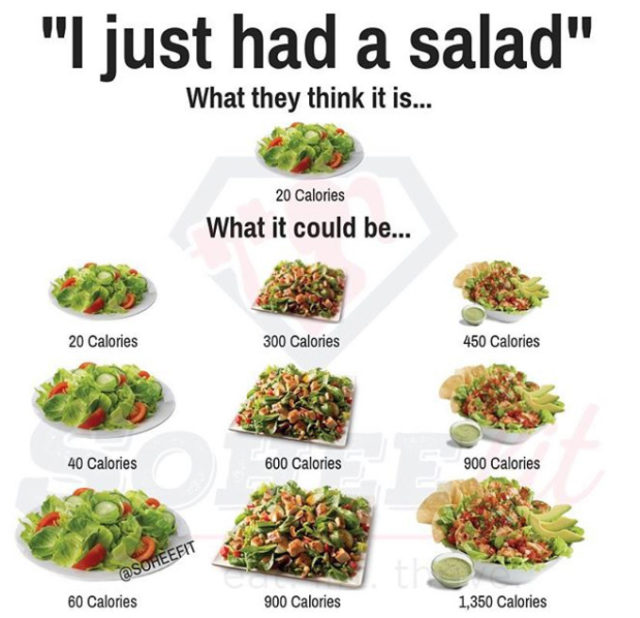
from Sohee Lee on her Instagram. It’s awesome, follow it.
#2: That’s total B.S.
Sure you might be able to do that every now and then but willpower might be a limited quantity, especially if you’re overweight and exposed to really awesome food.
“the present study extends knowledge by demonstrating that high BMI individuals, who are likely to engage in chronic inhibition of their eating behavior through dieting, are more likely to overeat when their self-control resources are depleted.” – Chronic Inhibition, Self-Control and Eating Behavior: Test of a ‘Resource Depletion’ Model
Don’t waste all of your restraint on dinner or any single meal.
When it comes to mindless eating?
- Buy smaller packages of snack food.
- Take the larger bag/ container and pre-portion out a “serving” before hand.
- Yes, real people do this. For example, you take a large bag of chips and partition out servings into smaller Ziploc bags. Seriously, it takes 2 minutes.
How Do I Ever Learn What A Real Portion is?
How doe anyone learn anything these days?
It’s called…Google.
Just Google “Portion size guide”
And over time, like 2 weeks later, you’ll have a pretty good handle on what a portion of fruits, veggies, meat, etc is.
I think the Precision Nutrition Portion Guide is the best.
EVERY BITE COUNTS
Even if it’s just one Hershey Kiss, one potato chip, barbeque sauce on your chicken….
When I turn the Rediwhip can upside down and press down?
Yep, those calories count too.
It ALL counts.
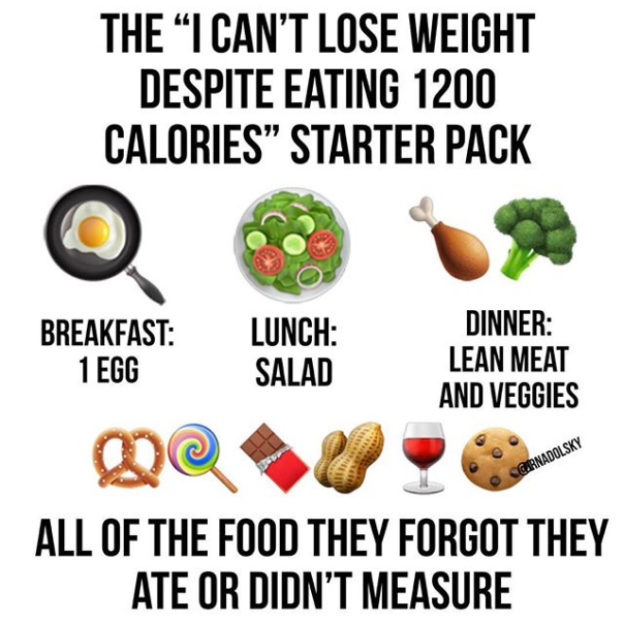
Dr. Spencer Nadolsky on the insta, another great one to follow.
Every, Single, Bite, Counts.
There are no “free foods”, no “negative calorie” foods, none of that.
It all counts.
It’s just really hard to eat any meaningful amount of raw celery.
Think about that for a minute.
Consuming COPIOUS amounts of raw celery.
Just RAW, ass, CELERY
Yep, gonna lose weight.
Alcohol
More than ANY OTHER THING, Alcohol is the bane of fat loss or, more accurately, body recomposition in my world.
Yes, some very fit people can drink like a fish and are in great shape.
In my experience they tend to be:
- Young (under 30).
- Very regular exercisers (more than 5 hours a week, and usually closer to 10 or more)
- Intense exercisers
- Fairly to super strict in their other dietary choices.
Essentially, they’re accounting for the extra alcohol calories through diet and tons of physical activity, which is fine, because they’re like Wolverine and possess super human recovery powers.
For the Non Super Heroes, those of us over 30.
Here’s the unfortunate truth I’ve learned after 16 years of doing this.
The more you drink in both volume and frequency,
the more likely you are to struggle with weight gain/ loss.
This actually runs counter to the literature.
“recent prospective studies show that light-to-moderate alcohol intake is not associated with adiposity gain.” – Alcohol Consumption and Obesity: An Update
The evidence points to light to moderate drinkers not gaining weight from drinking or having higher BMI’s overall.
*But this could be somewhat of a paradoxical finding and they could have higher bodyfat due to increased fat storage and decreased muscle hypertrophy (more on that in a minute).
I have seen more than once that simply cutting back on or dropping the alcohol really accelerates fat loss.
Wait, But Why?
It’s still calories in/ calories out.
Alcohol has 7 calories per gram.
Only fat has more at 9 cal/gm
Lets Play Calculator
Using this Alcohol calculator
2, (5 oz) glasses of wine a night = 1750 calories per week
That’s a half a pound a week. <—-and lets face it, you ain’t pouring 5 oz glasses.
In what are basically useless calories.
The Problems with Alcohol
1: We Don’t Adjust for it.
When we drink, we eat the same or MORE food calories as we would without drinking.
“consuming alcohol before or during a meal does not influence the amount of food eaten in that meal, despite increasing the energy density of the meal [5]. Thus, individuals do not appear to compensate for the added energy from alcohol in the short-term”- Alcohol Consumption and Obesity: An Update
So alcohol is more total calories in..no more calories out.
2: Alcohol Metabolism Promotes Fat Storage and Steals Muscle
Alcohol metabolism results in the formation of acetate.
Your cells can run off of acetate.
When you ingest alcohol its preferentially metabolized (burned off) because, unlike proteins, carbs and fats you can’t store alcohol.
“it (alcohol) has no storage capacity which means priority in oxidation compared with fat and carbohydrates.” – Alcohol and Food Intake
That’s right alcohol MUST be broken down (metabolized) and burned off first.
“Alcohol inhibits fat oxidation, suggesting that frequent alcohol consumption could lead to fat sparing, and thus higher body fat in the long term” – Alcohol Consumption and Obesity: An Update
Alcohol ingestion literally SHUTS OFF fat metabolism while the acetate (byproduct of alcohol metabolism) is still available. <—-no, fat metabolism isn’t 100% shut off, almost nothing in the human body is a 100% proposition.
What do you think happens to all of those calories you consume while the alcohol (acetate) is being used for fuel and not the food?
That’s right, FAT STORAGE.
What About My Gainzz Bro?
Low to moderate alcohol intake doesn’t seem to impair your Gainzz much.
“Low to moderate doses of alcohol have little to no effect, either directly or indirectly, on muscle protein balance”-Dysregulation of skeletal muscle protein metabolism by alcohol
Here’s the thing with most of these studies, especially the ones done on humans, it’s usually a single bout of exercise and ingestion of alcohol or for really short periods of time (2-8 weeks).
But chronic or high levels of alcohol intake?
It’s very bad, not good, stuff.
Essentially, the long term effect of chronic alcohol intake (above what in the real world is not a huge amount) is a decrease in your testosterone and growth hormone output. <– for a better understanding of alcohol and muscle phys, I HIGHLY recommend the previously linked article by Menno Henselmans
“The protracted imbalance in protein homeostasis resulting from excessive chronic alcohol consumption manifests as a decrease in muscle mass and cross-sectional area (CSA) of type II fiber-rich muscle and the development of progressive proximal myopathy (23, 33, 90, 147). The prolonged imbalance between skeletal muscle protein accretion and breakdown represents the basic mechanism of alcohol-induced myopathy. However, the reduced rate of muscle protein synthesis per se appears to be the primary contributor to this catabolic condition.”- Dysregulation of skeletal muscle protein metabolism by alcohol
Long and short of it is, you’re in an anabolic (muscle repair and growth) state less often, and when you are, its to a lesser degree and you’re in a more catabolic state (muscle loss), more often, to a greater degree.
So, while a little bit of alcohol probably won’t do anything to your gains, when it comes to weight loss it’s kind of a triple threat.
- “Empty” calories you’re not accounting for and actually may lead you to eating more.
- More likely to store fat and less likely to burn fat. <–but this is pretty much negated in an overall caloric deficit. However…..
- More likely to inhibit muscle growth and repair <—which is probably already compromised while in a caloric deficit. So it could be a double whammy of losing EXTRA muscle and GAINING extra fat (as a percentage) while still losing weight…#skinnyfat
So alcohol may not be directly making you fat (other than if consumed in excess calories), it’s chronic, long term, consumption is probably a real bitch for your overall body composition.
Believing The Hype
The diet industry was worth an estimated 66 BILLION in the US in 2017, 168 Billion world wide.
And that’s not getting smaller any time soon.
Between the diets of the year, the multi-level marketing schemes and the esoteric bullshit that gets passed off as a “diet hack”, thinking that ANY of these things is your magic bullet is really F#cking Stupid.
The worst part is…
YOU KNOW IT’s BS
As I’ve said before, lets make a bet.
For a MILLION Dollars, Which Strategy Will Work Best,
- Use diet and exercise to create a caloric deficit
- The “Diet Hack” of the moment
We both know the bet you’re going to take.
As long as you’re in a caloric deficit all diets work,
Yes, Paleo works, high carb works, Keto works, as long as you’re in a caloric deficit.
It all works as long as you’re in a caloric deficit and you STICK TO IT LONG ENOUGH.
“Significant weight loss was observed with any low-carbohydrate or low-fat diet. Weight loss differences between individual named diets were small. This supports the practice of recommending any diet that a patient will adhere to in order to lose weight.” – Comparison of weight loss among named diet programs in overweight and obese adults: a meta-analysis.
Sugar isn’t evil, its not addicting, and we’re actually EATING LESS OF IT.
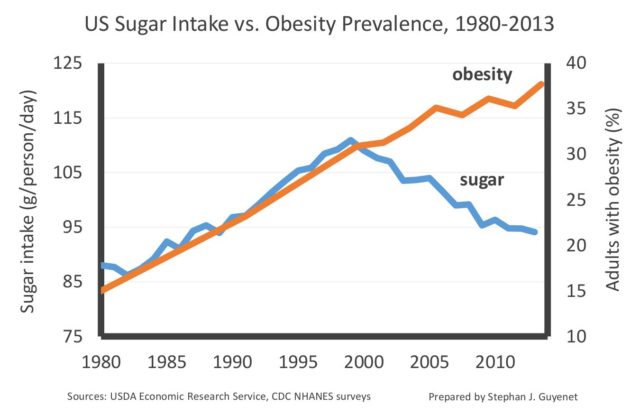 stolen from Precision Nutrition and Dr. Stephan Guyenet
stolen from Precision Nutrition and Dr. Stephan Guyenet
Yet getting fatter.
Taking shots of apple cider vinegar isn’t going to do jack sh@t other than kill your appetite for a few minutes cause it tastes like ass.
If you can stop looking for scapegoats reasons, excuses, blaming things, putting faith in BS and “the next big thing” and just admit the fact that,
Eating More Calories Than The Body Burns
accounts for 95.5% of the reason why you’re gaining or not losing weight,…
We’d all be a lot more successful with this process.
Soon, maybe not next time, cause these articles usually take more research than I wish they did, What YOU can do to help the weight loss/ management process along.


